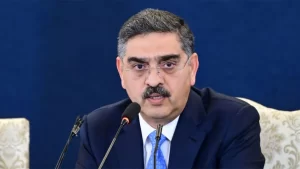Analyzing the Implications as PDM Government Misses Deficit Target-Navigating Fiscal Challenges

Navigating Fiscal Challenges Analyzing the Implications as PDM Government Misses Deficit Target
Introduction
In the realm of fiscal governance, maintaining a target budget deficit is a cornerstone of economic stability and growth. Recently, the PDM (Pakistan Democratic Movement) government found itself in the spotlight as it missed its deficit target. This development has sparked discussions among economists, policymakers, and citizens alike. In this article, we delve into the reasons behind the missed deficit target, its potential implications, and the steps that could be taken to address the situation.
Understanding the Budget Deficit
The budget deficit refers to the difference between a government’s total expenditures and its total revenues. A deficit occurs when expenditures surpass revenues, leading to increased borrowing to cover the shortfall. While some level of deficit is often necessary to stimulate economic growth, an excessive deficit can lead to fiscal instability and rising debt levels.
The Missed Deficit Target: Factors at Play
The PDM government’s failure to meet its deficit target can be attributed to a combination of internal and external factors:
- Economic Shocks:The global COVID-19 pandemic has unleashed unprecedented economic shocks, affecting economies worldwide. Reduced trade, disruptions in supply chains, and decreased consumer spending have had a significant impact on government revenues.
- Social Spending:Governments often ramp up social spending during crises to support citizens in need. While crucial, this can strain budgetary resources and contribute to a deficit.
- Revenue Shortfalls:Economic downturns can lead to reduced tax revenues, both due to lower economic activity and policy measures aimed at providing relief to businesses and individuals.
- Inflation and Exchange Rate Fluctuations:High inflation and exchange rate volatility can impact a government’s ability to manage its budget effectively.
- Debt Servicing:A significant portion of government expenditure may be allocated to servicing existing debt, limiting funds available for other essential services.
Implications of the Missed Deficit Target
The missed deficit target can have a range of implications for the economy:
- Fiscal Discipline:A missed deficit target raises concerns about the government’s ability to maintain fiscal discipline and adhere to its financial commitments.
- Debt Burden:A widening deficit can contribute to a higher national debt, potentially leading to increased debt servicing costs and crowding out spending on development projects.
- Investor Confidence:Persistent deficits may erode investor confidence, potentially leading to reduced foreign direct investment and capital flight.
- Inflationary Pressures:Financing deficits through borrowing from the central bank can lead to increased money supply and inflationary pressures.
- Credit Rating Impact:A higher deficit could lead credit rating agencies to reassess a country’s creditworthiness, potentially resulting in a downgrade.
Addressing the Situation: Potential Steps
- Strategic Spending:The government should prioritize spending on critical sectors, such as healthcare, education, and infrastructure, while optimizing other areas to reduce unnecessary expenditures.
- Revenue Enhancement:Exploring avenues to boost revenue, such as improving tax collection mechanisms, broadening the tax base, and reducing tax evasion, can help address revenue shortfalls.
- Debt Management:Implementing effective debt management strategies, including renegotiating terms and exploring favorable borrowing options, can alleviate debt burden.
- Economic Diversification:Focusing on economic diversification and promoting export-oriented industries can enhance revenue streams and reduce reliance on imports.
- Stimulating Growth:Encouraging private sector growth through investment-friendly policies and reforms can stimulate economic activity and increase government revenues.
Conclusion
The PDM government’s missed deficit target highlights the complexities and challenges of fiscal management in a rapidly evolving global landscape. While external shocks and internal factors have contributed to this situation, it’s essential for the government to adopt a proactive and strategic approach to address the deficit. By focusing on prudent spending, revenue enhancement, debt management, and economic diversification, the government can lay the groundwork for a more stable and sustainable fiscal future. As the nation navigates these fiscal challenges, collaboration between policymakers, economists, and citizens will be crucial in charting a path towards economic recovery and growth.
For More Related Articles Browse Our Website Blogster.pk
For social Connection You can also Visit and follow our Social media Platforms
Facebook , Instagram, Linkedin, Pinterest, Quora, Twitter, Youtube.








